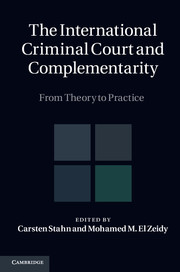Book contents
- Frontmatter
- Contents
- Acknowledgments
- Foreword by HE Judge Sang-Hyun Song
- Foreword by Patricia O’Brien
- Foreword by Silvia A. Fernandez de Gurmendi
- List of abbreviations
- Introduction: bridge over troubled waters?
- PART I General reflections
- PART II Origin and genesis of complementarity
- PART III Analytical dimensions of complementarity
- PART IV Interpretation and application
- PART IV (Continued) Interpretation and application
- 21 States’ obligations to investigate and prosecute perpetrators of international crimes: the perspective of the European Court of Human Rights
- 22 The law and policy of complementarity in relation to ‘criminal proceedings’ carried out by non-state organized armed groups
- 23 Complementarity and the crime of aggression
- 24 Complementarity and alternative forms of justice
- 25 Complementarity and ‘reverse cooperation’
- 26 In the hands of the state: implementing legislation and complementarity
- PART V Complementarity in perspective
- PART VI Complementarity in practice
- Index
- References
25 - Complementarity and ‘reverse cooperation’
from PART IV (Continued) - Interpretation and application
Published online by Cambridge University Press: 05 November 2014
- Frontmatter
- Contents
- Acknowledgments
- Foreword by HE Judge Sang-Hyun Song
- Foreword by Patricia O’Brien
- Foreword by Silvia A. Fernandez de Gurmendi
- List of abbreviations
- Introduction: bridge over troubled waters?
- PART I General reflections
- PART II Origin and genesis of complementarity
- PART III Analytical dimensions of complementarity
- PART IV Interpretation and application
- PART IV (Continued) Interpretation and application
- 21 States’ obligations to investigate and prosecute perpetrators of international crimes: the perspective of the European Court of Human Rights
- 22 The law and policy of complementarity in relation to ‘criminal proceedings’ carried out by non-state organized armed groups
- 23 Complementarity and the crime of aggression
- 24 Complementarity and alternative forms of justice
- 25 Complementarity and ‘reverse cooperation’
- 26 In the hands of the state: implementing legislation and complementarity
- PART V Complementarity in perspective
- PART VI Complementarity in practice
- Index
- References
Summary
This contribution addresses a specific aspect of the relationship between complementarity and cooperation.
Article 93(10) of the Rome Statute of the International Court entitles the Court to ‘cooperate with and provide assistance to a State Party conducting an investigation into or trial in respect of conduct which constitutes a crime within the jurisdiction of the Court or which constitutes a serious crime under the national law of the requesting State’, whether the state is a party or non-party to the Rome Statute. This assistance from the Court to states, oriented as it is in the opposite direction vis-à-vis the perspective in which cooperation is usually addressed (namely, from the states to the benefit of the Court), is labelled as ‘reverse cooperation’. It is submitted that reverse cooperation sits at the crossroads between complementarity, the cornerstone of the Rome Statute, and cooperation, the key to its effective functioning. Accordingly, reverse cooperation is looked at through the lenses of complementarity. The ability of the Court to provide assistance to a state might prove attractive to a state wishing to overcome its ‘unavailability’ and to prevent the International Criminal Court (‘ICC’) from stepping in. The risk that reverse cooperation be resorted to in bad faith, i.e. with a view to maliciously delaying or preventing the ICC from stepping in, is noted and possible methods to avert it are suggested.
- Type
- Chapter
- Information
- The International Criminal Court and ComplementarityFrom Theory to Practice, pp. 807 - 829Publisher: Cambridge University PressPrint publication year: 2011
References
- 5
- Cited by



